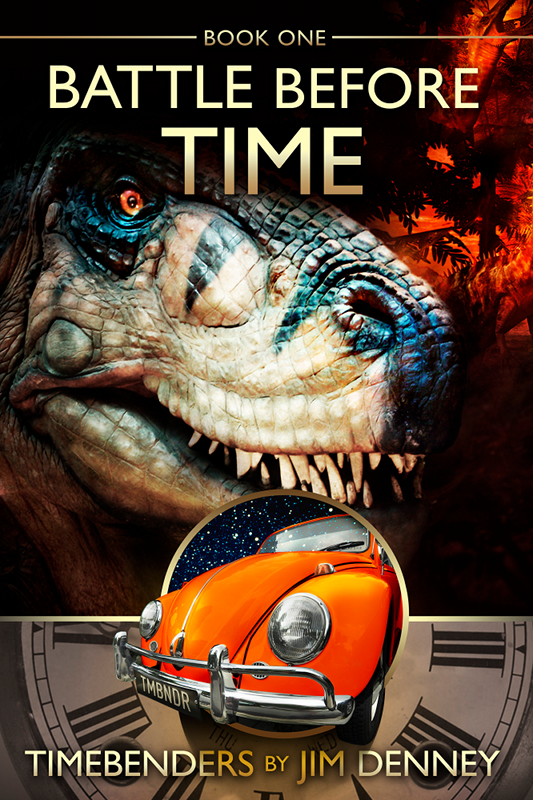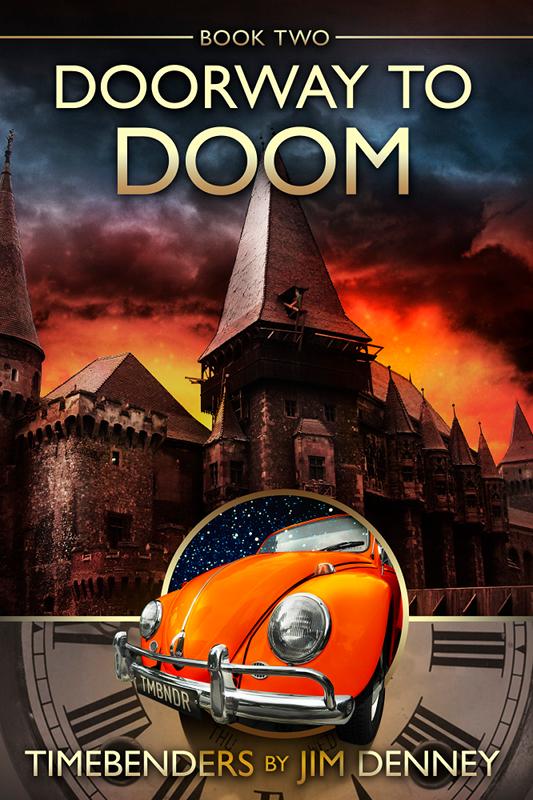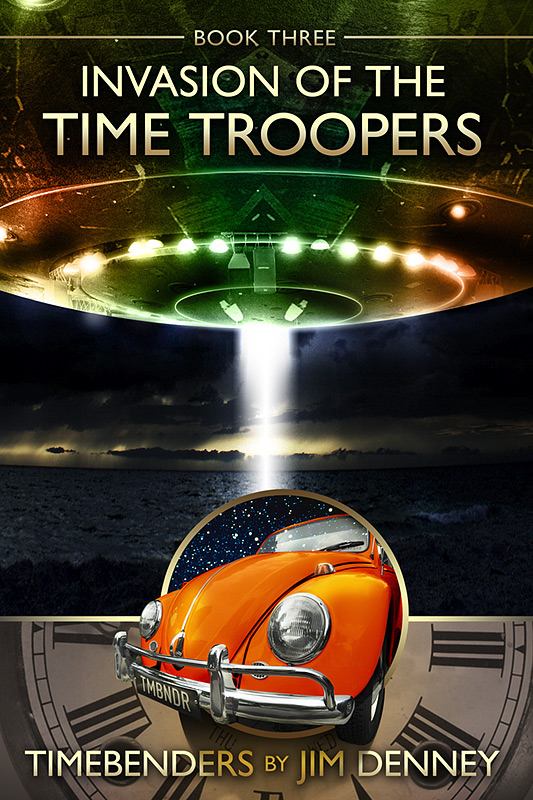I knew I wanted to be a writer when I was about nine years old. How about you? Do you have stories to tell? Books you want to write? Would you like to spend your days thinking up adventures and writing them down, like I do? Excellent! Writing is a lot of fun. If you’d like to be a writer, too, then I have some ideas that may help you become a writer.
Tip #1: Write About What You Really Care About

Battle Before Time by Jim Denney
I’ve heard people say, “The first rule of writing is, ‘Write what you know.'” Well, I have a little different point of view. I don’t say, “Write what you know.” I say, “Write what you really want to write about!”
The problem with “Write what you know” is that there are a lot of things that are fun to write about that nobody has ever done. For example, my Timebenders books are about time travel—but I’ve never traveled in time. I’ve never been scared out of my socks by a Tyrannosaurus rex. I’ve never been to an old English castle. I’ve never gone to the future and been chased by robots. If I could only write what I know from my own experience, I couldn’t have written Timebenders!
So I say the first rule of writing is to write whatever you really want to write about, whatever you think would make an interesting story, whatever you really care about. Now, when you do that, you can also use a lot of what you know. For example, you might write an interesting, imaginative story based on a vacation you took or an interesting person you know. But if you want to write about an adventure in outer space or about a visit to the Garden of Eden, you’ll just have to use your imagination and make it up—and that’s okay! Make it up and write it down. When you make up stories about times and places you’ve never been to, you’ll probably need to do some research. So, for example, if you write a story about the Civil War, you’ll need to read about the Civil War. One of the most famous books ever written about the Civil War was The Red Badge of Courage by Stephen Crane—yet Stephen Crane was never a soldier, and was never in the Civil War. He didn’t write what he knew; he did research. And he did his research so well that his book convinced many people that he had actually been a soldier in the war.
Tip #2: Read!
A writer is a reader first of all, so read every day. And when you read, don’t just read your favorite kind of book. Read all kinds of books, many kinds of books. Whether you like scary books or fantasy or adventure stories or romance, you should read other kinds of books as well. Read fiction and nonfiction. Read books about the lives of famous people, books about science, history, literature, and art, and books of poetry. Read the Bible. If you want to be a good writer, become a well-rounded reader.
Tip #3: Write All the Time!

Doorway to Doom by Jim Denney
Some people only like to write when they feel “inspired.” But I’ll let you in on a secret: I’ve found out that the best way to get inspired is to sit down and start writing—even when I don’t feel like writing! I write every day, and I don’t always feel “inspired” when I begin. But soon after I start writing, ideas and sentences start to flow. I start having fun. And I keep writing and writing until I find that I have written a lot of pages.
Keep a journal or diary, and write down observations about interesting events and interesting people. Write down things that happen to you. Write about things that make you feel happy, mad, scared, sad, or embarrassed. Someday, you may want to read your journal and use some of these observations as bits and pieces of a story or book.
When you write, remember that it’s okay to imitate writers you admire. I don’t mean you should “steal” story ideas or actual sentences from other writers. But study your favorite writers and see how they create characters, how they write believable dialogue, how they create realistic settings and descriptions, and how they use metaphors to create word pictures in the reader’s mind. It’s okay to study and imitate other writers—that’s how we learn.
Tip #4: Relax and Daydream
My best ideas come when I am relaxed, not when I’m super-concentrating. If you concentrate real hard and tell yourself, “Think! Think! Come up with an idea!,” your mind seems to freeze up. But when you relax, you loosen up your mind, you let your thoughts drift, and ideas start to flow.
Here are some relaxation ideas: Step away from your desk or computer for a moment, lie down on the couch or your bed, and just daydream about your story. You can listen to music, but keep the TV off. Or, you could take a walk or get some exercise. You might even find it relaxing to do some yardwork—sweeping the patio or raking the leaves in the yard.
As you let your thoughts drift, daydream about the characters in your story. What do they look like? What are their personalities like? How are your characters different from each other? Why do they like or dislike each other? What makes them get mad at each other? What common goals do they have to unite them? Are your characters messy or neat? Are they lazy or hard-working? Are they nice or mean? How do they talk? How can you give each character a unique-sounding voice?

Invasion of the Time Troopers by Jim Denney
Also, daydream about your setting. How can you describe the setting of your story and make it feel real? Let’s say your story takes place in a garden. As you daydream, ask yourself: What grows in this garden? What plants and flowers do I see? What are the unique smells and sounds in this garden? What kinds of insects and birds do you see and hear in this garden? Help your reader see, smell, and hear the garden. Get inside the skin of your characters and feel what they feel. Let the reader feel it, too: The feeling of warm, golden sunshine on a character’s face, or the fragrance of orange blossoms on the breeze. Help your reader to be there, right alongside your characters.
Also, daydream about your plot. Ask yourself: How can I start the story in an exciting way? What unexpected thing can I do to surprise the reader? What can I do at the end of the chapter to make the reader turn the page and keep reading? How can I keep the reader asking, “What happens next?”
Tip #5: Don’t Try to be Perfect!
One thing that will really mess you up as a writer is the feeling that you have to write perfectly. Don’t try to be perfect when you write. Tell yourself, “It’s okay to write badly. The important thing is to just write!”Get the words down, even if your sentences are terrible, even if you’re not sure of the spelling, even if you think it’s the worst piece of writing anyone has ever done. That’s okay. Just write!
You know what? I think I’m a pretty good writer—but I write badly all the time! And that’s okay! It doesn’t bother me a bit to write badly. You know why? Because it’s just a first draft. First drafts are supposed to be terrible! That’s why they call them “first drafts”! I don’t worry about a bad first draft, because I know I’m going to do a second draft, and a third draft, and by the time my third draft is done, it’s going to be a very good piece of writing.
When you write your first draft, write it as fast as you can. Don’t criticize it. Don’t go back over the sentence you just wrote and keep fiddling with it. Write that sentence and move on to the next sentence, and keep going, going, going, without looking back. The faster you write, the better you write. When you write quickly, you write with the creative side of your brain; when you write slowly and try to make it perfect, you write with the critical side of your brain.
The best writing is done by the creative side of your brain, because that is writing that flows, that soars, that inspires! Then, after you create your first draft, you let the critical side of your brain go over it, tidy it up, and make it sparkle. Both sides of your brain are important, but when you do your first draft, write it quickly, write it creatively. Don’t let the critical side of your brain interrupt your creative flow.
Tip #6: Welcome Criticism

Lost in Cydonia by Jim Denney
Never fear criticism—instead, welcome it! I always have people criticise my books before they’re published, because I want my books to be as good as can be. If there are mistakes or boring places or dumb ideas in my books, I hope someone helps me catch them before the book is printed!
Remember that writing is a matter of taste—and what one person finds interesting, another person will find dull. So don’t expect to please everybody, and don’t be surprised if you get conflicting advice from different people. That’s okay. Listen to the criticism and see if it makes sense to you. If the advice makes sense, then follow it. If the advice doesn’t ring true, ignore it and write it the way it seems best to you.
Show your writing to your friends and teachers. Start a writing club and share your stories with each other. Criticize each other’s stories—not in a mean or hurtful way, but in a helpful way: “I think this dialogue could be improved if you did such and such,” or, “What if your character decided to do this instead of that?” Encourage each other and help each other to do your finest work.
Keep writing!






